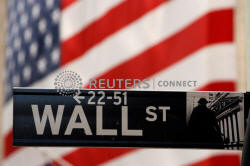Main Street leans toward Sanders, but Wall Street says
Trump
 Send a link to a friend
Send a link to a friend
 [February 28, 2020] By
Caroline Valetkevitch, April Joyner and Lewis Krauskopf [February 28, 2020] By
Caroline Valetkevitch, April Joyner and Lewis Krauskopf
NEW YORK (Reuters) - Vermont Senator Bernie
Sanders may be surging in the polls ahead of Super Tuesday, but some on
Wall Street have made their own conclusions on what November will bring:
four more years of President Donald Trump.
Ninety-five percent of participants in a Deutsche Bank survey of
investors, economists and other market participants released earlier
this month said Trump, a Republican, was either "extremely likely" or
"slightly likely" to win the general election.
Those results contrast with wider polls, which show any Democrat beating
Trump in a presidential contest. The latest Reuters/Ipsos poll,
conducted Feb. 19-25, showed Sanders with a seven percentage-point lead
over Trump in a hypothetical general election matchup.
The sharp mismatch in expectations could stoke market volatility if Wall
Streeters are wrong and a Democrat emerges victorious--especially if
that winner is Sanders, whose promises to break up big banks, take on
drug companies and essentially abolish private insurance in favor of a
single government-run plan have unnerved some investors. Many on Wall
Street were unprepared for Trump's win in 2016, which was followed by
sharp swings in asset prices.

"As an investor, I look at this and say the market's nightmare scenario
is that Bernie or Elizabeth Warren wins the election," said Phil
Orlando, chief equity market strategist, at Federated Investors, in New
York. "That's not our base case ... but it's a concern," he said.
Warren's policy proposals, like Sanders's, have also jangled nerves on
Wall Street.
Investors will be looking ahead to next Tuesday, when 14 states will
cast ballots and Sanders could build an overwhelming advantage if he
captures the lion's share of the available delegates.
Those primaries come as the markets are gripped by concerns over the
economic fallout from the spreading coronavirus outbreak, with the
number of cases beyond China accelerating rapidly. U.S. stocks plunged
for a sixth day on Thursday and the S&P 500 <.SPX> confirmed its fastest
correction in history.
Orlando said Sanders' rise in the polls also contributed to the recent
sell-off. Some investors also said continued volatility in markets or an
economic downturn could wear away at Trump's support.
While the market gyrations are likely to drown out some of the potential
impact from next week's results, some corners are already feeling the
effects of Sanders' recent success.
After Sanders' commanding victory in the Nevada caucuses in February,
shares of insurers such as UnitedHealth Group Inc <UNH.N> and Centene
Corp <CNC.N> sold off on what some analysts said were concerns over the
potential nomination of a Sanders nomination.
[to top of second column] |

A Wall Street sign is seen outside of the New York Stock Exchange
September 19, 2008. REUTERS/Lucas Jackson/File Photo

"If Bernie runs the table and suddenly he becomes unstoppable, I think we're
going to see the jitters again," said Teresa McRoberts, a portfolio manager
focused on healthcare at Fred Alger Management in New York.
(Graphic: Sanders nomination odds vs health insurer shares-
https://fingfx.thomsonreuters.com/
gfx/editorcharts/
USA-STOCKS/0H001R8DKC2J/eikon.png)
The effects on the broader market of a big Sanders win on Tuesday are less
clear. Only 13% of participants in Deutsche Bank's poll believed Sanders could
beat Trump in the general election, compared to 22% for former Vice President
Joe Biden and 45% for former New York Mayor Michael Bloomberg.
Gary Bradshaw, portfolio manager at Hodges Capital Management in Dallas, Texas,
has kept most of his attention on the coronavirus outbreak in recent days and
isn't eager to make any election-related portfolio moves yet.
"I think most of my clients pretty much are like me, thinking Trump is going
win," he said.
Still, some investors believe the election can fuel market swings this year.
Volume on the October futures contract <VXc8> for the Cboe Volatility Index <.VIX>
hit 16,247 between Jan. 2 and Feb. 21, according to Cboe Global Markets <CBOE.Z>.
That dwarfs the 471 contracts that traded in 2016 from Jan. 4 to Feb. 19. VIX
futures reflect expectations for volatility in the month following their
expiration.
On Thursday, October VIX futures traded at 22.5, versus 19.57 for September
futures <VXc7> and 20.22 for November futures <VXc9>, indicating heightened
expectations for volatility near election day.
Cboe Global Markets listed October VIX futures a month earlier than usual in
response to customers eager to place bets on election-induced volatility, said
Kevin Davitt, senior instructor at the exchange's options institute. The
exchange also listed September and November futures ahead of their usual
schedule.
Bill Northey, senior investment director at U.S. Bank Wealth Management, said
the election will become a greater concern for investors once the Democratic
party selects its nominee.
"There are a number of places where the policy divides are incredibly wide," he
said.
(Graphic: Positioning for U.S. election volatility -
https://fingfx.thomsonreuters.com/
gfx/mkt/13/2616/2581/Pasted%20Image.jpg)
(Reporting by Caroline Valetkevitch, April Joyner and Lewis Krauskopf;
Additional reporting by Chris Kahn; Editing by Ira Iosebashvili and Christopher
Cushing)
[© 2020 Thomson Reuters. All rights
reserved.] Copyright 2020 Reuters. All rights reserved. This material may not be published,
broadcast, rewritten or redistributed.
Thompson Reuters is solely responsible for this content. |